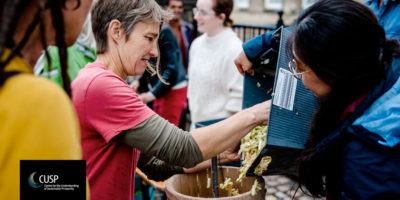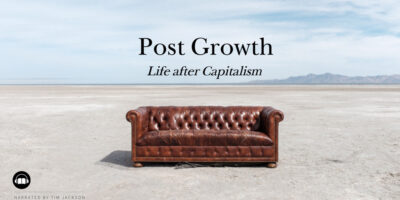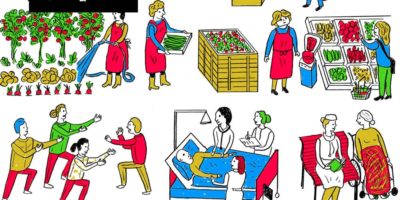Utopias in Hibernation | Blog by Malaika Cunningham
The latest blog in the Collecting Real Utopias series is embracing winter and darkness with a celebration of rest and slowness. Speaking to our addiction to productivity, to usefulness, about how this feeds capitalism, colonial violence, environmental destruction and personal burnouts, Malaika argues that rest and slowness might actually be the most important act of resistance we can enact. (This article also appeared on the Arts Admin website).
Blog by MALAIKA CUNNINGHAM
Firstly, I would like to offer a massive thank you to Laura Russell, who conducted an invaluable literature review into the ‘politics of rest’ for this blog.
This blog series is a celebration of real utopias—with an explicit agenda of building solidarity, awareness, and replication of small projects which challenge our system of exploitative capitalism. This builds on the work of the sociologist Erik Olin Wright. He argued that through celebrating, connecting, and expanding our real utopias, we could create the fissures which will break this system, revealing a more caring and sustainable alternative. For a more in-depth definition of ‘real utopias’ and its role in social change check out my first blog, or Olin Wright’s own work!
With today’s blog I want to embrace winter and darkness with a celebration of rest and slowness. Proclaiming rest as an anti-capitalist gesture and acknowledging projects and spaces which embody this practice. Rest should not be limited to its contribution to productivity, as Lucky Kobugabe and Iris Nxumalo-De Smidt argue ‘we need to start to think about it more in terms of social justice, honour, liberation, respect, and care for others and ourselves.’
So let’s talk about our addiction to productivity, to usefulness, about how this feeds capitalism, colonial violence, environmental destruction & personal burnouts. And how rest and slowness might actually be the most important act of resistance we can enact. Jenny Odell introduced me to the parable of the useless tree by Zhuang Zhou in her excellent book ‘How to Do Nothing: Resisting the Attention Economy’. I’d like to set the tone by paraphrasing it here:
There was once an enormous and very old oak tree. Its trunk was made up of many pieces. And its twisted branches spread wide around it. One day a carpenter passed by the giant tree and stopped. He was impressed by its size, but almost immediately declared it a “worthless tree”. Exclaiming “A boat made from its branches would sink, a coffin would soon rot. The tree is too gnarled to be used for timber.” He then walked off into the woods in search of more useful trees.
Soon afterwards the old oak appeared to the carpenter in a dream and asked “What are you comparing me to? A cinnamon tree would be cut down for its bark. A spruce for its straight trunk. The cherry and pear are stripped of their fruits every year. Their lives are bitter because of their usefulness. I have tried very hard to be useless – how else could I have grown so large? You are a worthless man about to die – how do you know I am a worthless tree?
Our understanding of what is useful has perhaps never been so narrow, so instrumental. Our time equals money. Nature has become resources. Productivity is a deeply ingrained value. Rest and slowness are easy, early casualities in our drive for more, better, faster. In the arts – where freelance precarity further ingrains ‘time = money’ – busyness is worn as a badge of honour, but also as a form of survival. The exhausted body is celebrated, but can also be necessary to pay the rent. As winter draws us inside, and as darkness slows us down, can we find ways to resist this? To embrace rest and slowness with wide open arms, as an act of care and of resistance.
The first real utopian space I want to celebrate today is The Black Hair Care Project, led by ADIRA in Sheffield. This is a project which offers free hair care to “anyone with African or Caribbean heritage with mental health issues.” The project acknowledges the link between Black hair care and mental health and aims to offer these spaces of care for free to all who need it. The act of braiding is a slow, time-consuming, intimate, and a collective activity. The salon and the barber shop have both been highlighted as sites of informal, community mental health support – in performances such as Inua Ellam’s Barber Shop Chronicles, and in the work of authors such as Emma Dabiri.
This also taps into a broader value of slow, collective acts—repetitive gestures which resist efficiency or mechanisation and demand community. Acts which require care and time. In Ghent earlier this year I attended a performance co-created between arts company Par Hasard and a group of Turkish weavers. We sat around a mountain of unspun wool and together we cleaned it. Whilst we worked we listened to stories about empathy and occasionally offered our own thoughts. A musician in the corner sometimes gave us a song. It was slow—each contribution translated into Flemish, Turkish and English. The pace was crucial, we could not rush it.
These slow moments are rare—even our commutes and train journeys have become moments to imbibe more information via podcasts and news apps. I have internalised each hour of my time as a unit to be spent. It brings me to the second real utopia I want to highlight—The League of Less Work project (co-led by Huddlecraft and LearnJam). In November, before jumping on a train, I ‘spent’ my lunch hour in a zoom meeting with this group. Over the hour they presented their project and I left with a slightly altered relationship to my time and work. The League of Less Work brought together a collection of workers—freelance, employees, company directors—each committed to working less over an 8-month period. They met monthly to discuss the politics of rest, as well as practical challenges, and techniques to working less. The zoom I went to was near the conclusion of the project and each of the participants offered such clear and practical approaches to rest. I want to pass on a few of the notes and questions I gathered:
1. “Just because you can doesn’t mean you should.”
2. What does it look like to meaningfully decouple time and money?
3. What are the roots of your beliefs about work and rest? What are these roots feeding?
This last one was an exercise borrowed from Vanessa de Oliveira Andreotti’s book Hospicing Modernity, which challenges us “to grow up, step up, and show up for ourselves, our communities, and the living Earth, and to interrupt the modern behavior patterns that are killing the planet we’re part of.” I intend to read it over this winter break.
In my life I have often seen rest and slowness as inconvenient and occasionally necessary. I am impatient and efficient. I am fast and restless. What I am trying to learn now is the practice of slowness and rest—a lesson that does not come easily, but one which (ironically) requires work. This winter, in the dark and the cold, I am beginning by acknowledging this as a political as well as a personal gesture. Rest is Resistance—over the next few months, I invite you to resist.
This series is created in partnership with Arts Admin.



